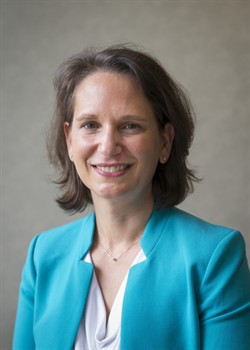 Temple Law Visiting Assistant Professor and Scholar in Residence Pamela Bookman has had some rather notable high points in her legal career so far: clerkships at the United States Supreme Court, the International Court of Justice at the Hague, and the Court of Appeals for the Second Circuit, and a high stakes practice in WilmerHale’s New York office, where she represented clients in complex commercial disputes with a focus on transnational litigation. Hers is clearly a star on the rise.
Temple Law Visiting Assistant Professor and Scholar in Residence Pamela Bookman has had some rather notable high points in her legal career so far: clerkships at the United States Supreme Court, the International Court of Justice at the Hague, and the Court of Appeals for the Second Circuit, and a high stakes practice in WilmerHale’s New York office, where she represented clients in complex commercial disputes with a focus on transnational litigation. Hers is clearly a star on the rise.
Fueling that momentum is Bookman’s scholarship, which centers largely on how questions of jurisdiction and procedure in U.S. courts impact transnational companies doing business here. “I study the intersection between international business and civil procedure,” Bookman explains. “In today’s globalized economy, businesses increasingly operate in several countries at once and may face litigation in several countries at once. This creates complex and fascinating conflicts among different countries’ laws and legal systems that U.S. courts-and U.S. lawyers-must confront as they adapt to the complexities of transnational business practices and globalization.” Indeed, the Supreme Court has been particularly active in this area in recent years. For example, the Supreme Court’s 2014 decision in Daimler v. Bauman, which upended previous understandings about when US courts can exercise jurisdiction over foreign companies, is a prime example of one such adaptation. “In Daimler,” says Bookman, “the Court said that a common understanding of general jurisdiction, that it can arise when the defendant is simply doing business in the place of litigation, was wrong.” The shift is significant. “What impact will Daimler have on foreign corporations as they decide whether and how to do business here?” Bookman wonders. “How do lawyers advise clients in this environment?”
But jurisdiction isn’t the only issue complicating matters – the procedural rules governing litigation once jurisdiction is established have also become outdated in an increasingly global economy. It’s an issue Bookman saw come up time and again in her practice at WilmerHale. “In one case, our client sued a foreign government over a matter that would traditionally have been resolved through international arbitration, but because of the way the contracts were drafted, we found ourselves in federal court.” Bookman found herself wanting to explore the questions raised by the case in greater depth. “The case raised complicated issues about how a court’s procedural rules factor into international business decision-making,” she says. “I became very interested in studying them from an in-depth, academic perspective.”
But that doesn’t mean that her work has lost its practical focus. “My research is intended both to contribute to the scholarly discourse and to serve as a practice resource for lawyers working in the field,” Bookman explains, while noting Temple’s shared commitment to that goal. “Temple Law School has long been at the forefront of building and strengthening the bridge between theory and practice that inures to the benefit of students, academics, and the bar, and I want my work to contribute to that effort.”
“Professor Bookman’s scholarship raises important and provocative questions about sovereignty and the rule of law,” remarked Dean JoAnne Epps. “Her insight into how these foundational questions inform our journey through today’s complicated world, and her passion for both teaching and the law will be of great benefit to our students.” Bookman echoed Dean Epps’ enthusiasm. “I am so excited to be at Temple. The faculty is fantastic — brilliant and collegial and supportive of each other and of the institution. It’s an honor to get to work with them. My students are also fabulous. I’m teaching Contracts in the evening division and in every class I’m so impressed by the students’ engagement, their work ethic, and their commitment to changing their lives and their world with their legal careers.”
It’s that same passion for the law that has shaped Bookman’s career thus far. “I love this job,” she says. “I loved practice. I love teaching the law, I love learning more about it every day, and I can’t wait to see where we, the people who bring it to life, go next.”
